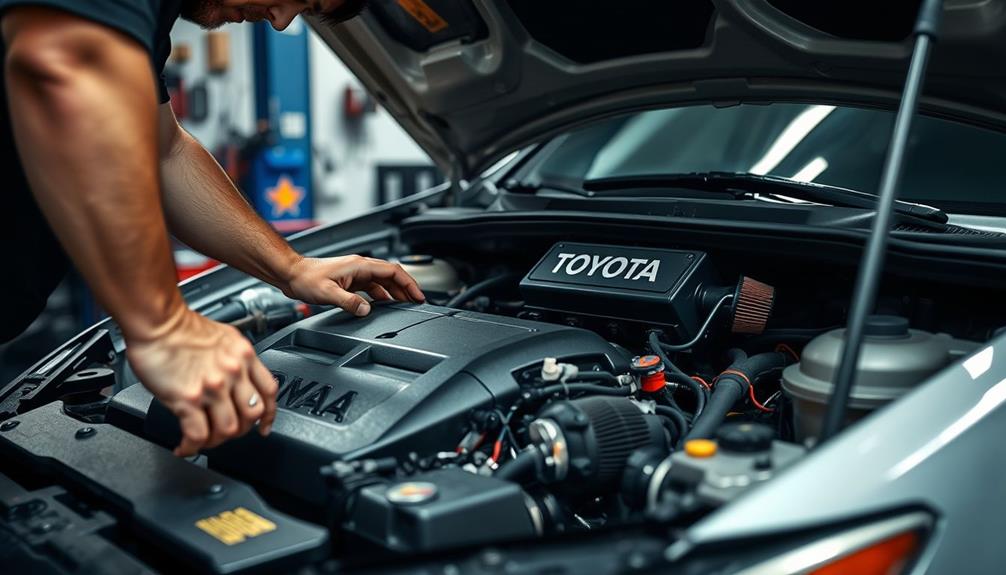Tuning your Toyota can risk voiding your warranty, especially if it causes mechanical failures linked to your modifications. While the Magnuson-Moss Warranty Act keeps manufacturers from denying claims just for adding aftermarket parts, they can reject a claim if they prove the mod caused the issue. ECU tuning can leave detectable traces, which may impact warranty coverage. It's vital to document all modifications and maintain clear communication with your dealership. Not all mods automatically void your warranty, but understanding your rights and the potential risks is important before you make any changes. Explore more details to stay informed.
Key Takeaways
- Tuning your Toyota may risk voiding the powertrain warranty if mechanical failures are linked to the modifications.
- Under the Magnuson-Moss Warranty Act, warranty claims can only be denied if the manufacturer proves the modification caused the failure.
- ECU tuning leaves detectable traces that dealerships can identify, potentially impacting warranty claims during service visits.
- Maintaining detailed documentation of modifications and service history can strengthen your position in case of warranty disputes.
- It's advisable to consult with your dealership about their specific policies on tuning and modifications before making changes.
Warranty Implications of Tuning
Tuning your Toyota can have considerable warranty implications that you should be aware of. When you decide to modify your vehicle, especially with aftermarket parts or ECU tuning, you risk voiding your powertrain warranty. If a mechanical failure occurs and the manufacturer proves it's due to your modifications, they might deny your warranty claim.
While the Magnuson-Moss Warranty Act offers some consumer protection, it requires manufacturers to show that a modification directly caused the failure. However, this protection often doesn't apply to ECU tuning.
Dealers hold substantial discretion in warranty claims related to non-factory modifications. Their documentation practices can vary, which means your outcome may hinge on the specific dealer you're working with. It's crucial to note that ECU tunes create detectable footprints in your vehicle's computer system. Even if you revert to stock software, evidence of prior tuning may still be present.
Interestingly, many Toyota owners have reported successful warranty claims despite having tuned their vehicles, indicating that experiences differ considerably based on dealer practices and communication.
Understanding Magnuson-Moss Act

When it comes to protecting your warranty, understanding the Magnuson-Moss Warranty Act is essential. This federal law prevents manufacturers from voiding your warranty just because you've installed an aftermarket part. However, there's a catch: they must prove that the modification directly caused any failure before denying warranty claims.
Under the Magnuson-Moss Warranty Act, while specific warranty claims can be denied, the entire warranty can't be voided. This means that if you modify your vehicle, some individual claims might be affected, but your overall warranty remains intact. For manufacturers to deny coverage, they need to provide clear and specific evidence linking the aftermarket modifications to the issue at hand.
Documentation of any modifications you make is vital. It helps establish the context of any problems you encounter, strengthening your position during warranty claims.
Keep in mind that the Act primarily deals with physical modifications, like bolted-on parts, and is less straightforward when it comes to tuning software changes. Always be aware of how your modifications can interact with your warranty rights under the Magnuson-Moss Warranty Act to avoid surprises down the road.
Detecting Modifications in Vehicles

Modifications to your vehicle, including tuning, often leave traces in the computer system that technicians can detect during service visits.
When it comes to detecting modifications in vehicles, ECU tuning is particularly notable. ECU flashing alters the checksum, which trained dealers can identify when they access your vehicle's OBD2 connection. While many aftermarket performance mods might go unnoticed, significant changes aren't so subtle.
Additionally, stock tune calibration IDs are visible in the ECU. If a technician checks these details during diagnostics, they could uncover any modifications you've made.
Some dealerships maintain detailed checklists for modified parts, which can influence warranty claims based on your service history. This means that even minor changes might lead to warranty denials if a technician spots them during routine maintenance.
To minimize the chances of detection, consider maintaining a good relationship with your dealership and being transparent about any modifications. Communication can help you navigate potential issues related to warranty coverage.
Ultimately, understanding what modifications leave detectable footprints can help you make informed decisions about your vehicle without jeopardizing your warranty.
Risks of Aftermarket Modifications

When you modify your Toyota with aftermarket parts, you risk facing warranty claim denials if those modifications are linked to any failures.
It's important to understand that while not all changes void your warranty, specific claims can be rejected if the manufacturer proves a connection.
Additionally, performance modifications might impact your vehicle's reliability, leading to increased repair costs and potential disputes with your dealership.
Warranty Claim Denials
Aftermarket modifications can really complicate warranty claims, especially when it comes to powertrain issues like engine and transmission failures. If you've tuned your ECU or added other aftermarket mods, you might face warranty claim denials if something goes wrong.
Manufacturers may argue that these modifications caused the damage, leading to a frustrating battle over your warranty. Under the Magnuson-Moss Warranty Act, they must prove that a specific modification directly caused the failure to deny your claim. However, this process can be complicated and time-consuming, leaving you at a disadvantage.
It's vital to document all modifications, as dealerships often share this information. If they know about your aftermarket mods, it could impact your claim's outcome.
Interestingly, many consumers report successful warranty claims despite having performance modifications. Experiences can vary greatly depending on dealership practices and communication.
Performance Impact Concerns
Tuning your Toyota can enhance performance and driving experience, but it comes with significant risks. When you modify your vehicle with tuning software, you might inadvertently compromise your warranty.
Here are some key concerns to evaluate:
- Warranty Coverage: If your modifications cause mechanical failures, especially related to the engine or transmission, Toyota can deny warranty coverage.
- ECU Memory: Many believe their changes are undetectable; however, the ECU retains a history of tuning alterations that can lead to claim denial if discovered.
- Performance Parameters: Altering these parameters can lead to increased repair costs and potential legal disputes over warranty claims.
- Documentation: Keeping detailed records of all modifications is essential for substantiating any future warranty claims.
Dealer Attitudes Toward Tuning

Dealer attitudes toward tuning can greatly affect your experience with warranty claims. Some dealerships are more accommodating and willing to work on modified vehicles, while others might deny your warranty claims outright due to aftermarket mods.
It's vital to understand that many dealers prioritize liability concerns, which often means they'll require you to remove any modifications before servicing your vehicle. This can complicate your warranty process.
Communication with your service advisor is imperative. Building a trusting relationship can make it easier to navigate warranty claims for tuned vehicles. Be upfront about your modifications, as some dealerships have specific protocols in place for documenting these changes. This documentation can influence whether your warranty claim is accepted or denied.
Additionally, corporate policies and training on aftermarket modifications can lead to inconsistencies in how different dealerships handle warranty claims related to tuning. Some might be more lenient, while others could be strict.
Knowing your dealer's stance can save you time and potential headaches down the road. Always do your homework before making any modifications, as dealer attitudes toward tuning can vary considerably.
Types of Modifications to Consider

When evaluating modifications for your Toyota, it's important to weigh the impact each type can have on your warranty. Certain modifications may lead to warranty claim denials, especially if they affect key parts of the vehicle.
Here are some types of modifications to assess:
- Cosmetic Modifications: Items like decals or wraps are generally safe and don't usually impact warranty coverage.
- Performance Modifications: Upgrades such as air intakes and exhaust systems can cause warranty issues, particularly if they relate to engine or transmission problems.
- Electrical Modifications: Aftermarket stereo systems may introduce risks, as faults can lead to warranty denials related to electrical components.
- Suspension Changes: Lowering springs or other suspension modifications could affect warranty claims if they result in mechanical failures.
To protect your warranty, always keep thorough documentation of all modifications. This will support any warranty claims and clarify the connection between your upgrades and potential issues.
Being informed about the implications of each modification type can help you enjoy your vehicle without unexpectedly losing warranty coverage.
Legal Protections for Consumers

When you're considering modifications to your Toyota, it's essential to understand the legal protections available under the Magnuson-Moss Warranty Act.
This law requires manufacturers to prove that any aftermarket change directly caused a failure before voiding your warranty.
Keeping thorough documentation of your modifications can help you navigate potential claims and maintain your coverage.
Magnuson-Moss Warranty Act
Many consumers aren't aware of the protections offered by the Magnuson-Moss Warranty Act, which safeguards your rights when it comes to aftermarket modifications.
This federal law guarantees that manufacturers can't simply void the warranty due to the installation of aftermarket parts unless they can prove that the modification caused the failure.
Here are some key points to keep in mind:
- Causation Requirement: A warranty can only be denied if there's clear evidence linking the aftermarket modification to the specific issue.
- Documentation Matters: Keep records of all modifications, as manufacturers must provide proof that your modification caused the failure to deny warranty coverage.
- Physical vs. Software Modifications: The Act primarily covers physical changes, like bolt-on parts, rather than software tuning, which may have different implications.
- Know Your Rights: Understanding your rights under the Magnuson-Moss Warranty Act helps you navigate disputes effectively with manufacturers.
Causation Requirement Explained
Understanding the causation requirement is essential for any vehicle owner considering aftermarket modifications. Under the Magnuson-Moss Warranty Act, manufacturers can't simply void your entire warranty because of aftermarket parts. They must prove that a specific modification, like tuning, directly caused a failure in your vehicle.
This means that while certain claims related to modifications can be denied, the overall warranty remains intact unless causation is established.
The burden of proof lies with the manufacturer. If they can't demonstrate that the aftermarket modification was the direct cause of the issue, you should be able to maintain your warranty coverage. This provides a layer of protection for you against unfair warranty denials, ensuring that not all aftermarket modifications will result in a voided warranty.
It's important to remember that some modifications might risk warranty claims, but understanding the causation requirement helps you navigate these waters more confidently.
Documentation Importance
Having a solid grasp of the causation requirement is just the beginning; documentation plays an essential role in protecting your warranty.
When you make aftermarket modifications, detailed records become your best ally. Under the Magnuson-Moss Warranty Act, manufacturers must prove that a specific modification caused a failure to deny a warranty claim. This makes thorough documentation a key asset for you as a consumer.
To make sure you're covered, keep track of the following:
- Receipts: Always save receipts for aftermarket parts and installations.
- Installation Paperwork: Document any work done, including who performed the installation.
- Service History: Maintain a detailed record of all service visits and repairs.
- Clear Communication: Inform your dealership about modifications to avoid misunderstandings.
Documentation and Record Keeping

Documentation and record keeping are essential when it comes to maintaining your Toyota warranty after modifications. To protect your warranty claims, you need to keep detailed documentation of all modifications, including receipts and installation records. This evidence can demonstrate that your changes didn't cause any failures, which is vital if issues arise.
It's also wise to maintain a service history log that notes any repairs or maintenance performed. This log can serve as proof of proper vehicle care and can aid in disputes regarding warranty claims.
Before making any modifications, communicate with your dealership to clarify their specific policies on documentation and how it may impact your warranty coverage.
Additionally, documenting any correspondence with dealership service advisors about warranty claims and modifications can help establish a clear understanding of their stance on aftermarket parts.
To streamline the process of filing claims and addressing warranty disputes, consider utilizing a dedicated folder for all warranty-related documents, including modification records and service appointments. Keeping everything organized will make it easier for you to submit claims and defend your modifications if necessary.
Common Misconceptions About Warranties

Many people think that any modification to their Toyota, like ECU tuning, automatically voids their warranty, but that's not the case.
Instead, warranty claims can only be denied if a modification directly causes a specific failure.
Understanding the difference between a denied claim and a voided warranty can save you from unnecessary confusion.
Warranty Voids Explained
Understanding warranty voids can save you from unnecessary frustration when modifying your Toyota.
It's a common misconception that all vehicle mods automatically void your entire warranty. In reality, the Magnuson-Moss Warranty Act protects you by ensuring that only specific claims can be denied if a modification is proven to cause a failure.
Here are four essential points to keep in mind:
- Specific Claims: Warranty claims can be denied based on aftermarket mods, but this doesn't mean your entire warranty is voided.
- Documentation Matters: Keep thorough records of all mods and warranty work done. This documentation supports your rights in case of disputes.
- Claim Denial vs. Warranty Void: A denied claim merely means that claim is affected by the mods, not that your warranty is void.
- Minor Modifications: Even small changes can lead to claim denials, but they won't impact your overall warranty coverage.
Claim Denials Vs. Voids
When it comes to your Toyota's warranty, it's important to distinguish between claim denials and a voided warranty. Many people mistakenly believe that any aftermarket modifications will automatically void their warranty. However, this isn't the case.
While manufacturers can deny specific claims related to those modifications, they can't void your entire warranty just because you've made changes to your vehicle.
Under the Magnuson-Moss Warranty Act, the burden of proof lies with the manufacturer. They must demonstrate that a modification directly caused a failure before denying a warranty claim.
So, if your aftermarket modifications don't cause an issue, your warranty remains intact for other components.
To avoid misunderstandings, keep thorough documentation of all modifications and communicate clearly with your dealership. This proactive approach can help clarify warranty terms and support your claims.
Aftermarket Parts Misunderstandings
Aftermarket parts can create confusion for Toyota owners, leading to common misconceptions about warranties. Many believe that simply installing aftermarket parts will automatically void their warranty. However, the reality is more nuanced. Here are some key points to understand:
- The Magnuson-Moss Warranty Act states warranties can only be voided if the manufacturer proves that a modification caused a failure.
- While individual warranty claims may be denied due to aftermarket parts, the entire warranty isn't voided just because you've made modifications.
- Documenting all modifications is essential; it helps support your case if a warranty claim is denied.
- Performance modifications, especially tuning, tend to attract more scrutiny than cosmetic changes, which usually have less impact on warranty coverage.
Misunderstandings often stem from unclear communication between consumers and dealerships about how aftermarket parts affect warranty claims.
Best Practices for Modding

Modifying your Toyota can be exciting, but it's essential to approach this with care to protect your warranty. Focus on bolt-on modifications like exhaust systems and air intakes, as these are generally safer for maintaining warranty coverage. Avoid extensive changes such as ECU tuning, which could raise red flags with your dealership.
Always document all modifications and keep your receipts. Thorough records can support warranty claims and clarify how your alterations might impact vehicle performance.
Before diving into significant modifications, consult with your dealership. Understanding their specific warranty policies can save you headaches later on, especially regarding how aftermarket parts might affect coverage.
Another smart strategy is to evaluate reversible modifications. If you can easily restore your vehicle to its stock form, it can mitigate warranty risks when service is required.
Building a positive relationship with your dealership is also important—communicate openly about any modifications you plan to make. This fosters trust and can lead to smoother warranty processes should you need assistance down the line.
Frequently Asked Questions
Does Aftermarket Tuning Void Warranty?
Aftermarket tuning can potentially void your warranty, especially if it leads to mechanical issues. It's crucial to consult your dealership about their specific policies and consider the risks before making any modifications to your vehicle.
What Voids a Toyota Car Warranty?
Imagine buying a beautiful painting, then splattering paint on it. That's how modifications can void your warranty. Performance changes, especially to the engine, often raise red flags, while minor tweaks usually don't. Keep documentation handy!
Does ECU Tune Void Toyota Warranty?
Tuning your ECU can risk voiding your warranty, as manufacturers often view it as a high-risk modification. It's essential to communicate with your dealership and document changes to protect your warranty status effectively.
What Can I Modify on My Car Without Voiding Warranty?
You can safely modify your car with cosmetic upgrades, reversible bolt-on performance parts, and consider suspension changes if OEM parts are restored before service. Just document everything and communicate with your dealership to protect your warranty.
Conclusion
Before diving into modifications, remember that 60% of vehicle owners believe their warranty is voided after any modification—this isn't necessarily true! Understanding the Magnuson-Moss Act can help protect your rights. Keep thorough documentation of your mods and communicate with your dealer to avoid surprises. By following best practices, you can enjoy tuning your Toyota without sacrificing your warranty. Stay informed and make smart choices to keep your car running at its best!










